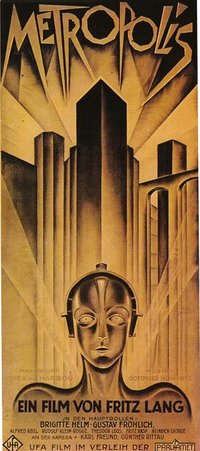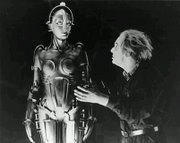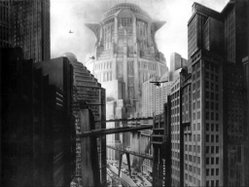Metropolis movie
Metropolis is a very early science fiction film that was produced in Germany during the brief years of the Weimar Republic. It is set in a futuristic urban dystopia. more...
Released in 1927, it is a black and white silent film created by the famed Austrian director Fritz Lang and was the most expensive silent film of that time, costing approximately 7 million Marks (equivalent to around $200 million today).
The screenplay was written in 1924 by Lang and his wife, Thea von Harbou, and novelized in 1926 by von Harbou.
Plot
- Note: There are multiple versions of Metropolis. The original German version remained unseen for many decades. Of this version, a quarter of the footage is believed to be permanently lost. The U.S. version, shortened and re-written by Channing Pollock, is the most commonly known and discussed.
The film is set in the year 2026, in the extraordinary Gothic skyscrapers of a corporate city-state, the Metropolis of the title. Society has been divided into two rigid groups: one of planners or thinkers, who live high above the earth in luxury, and another of workers who live underground toiling to sustain the lives of the privileged. The city is run by Johhan 'Joh' Fredersen (Alfred Abel).
The beautiful and evangelical figure Maria (Brigitte Helm) takes up the cause of the workers. She advises the desperate workers not to start a revolution, and instead wait for the arrival of "The Mediator", who, she says, will unite the two halves of society. The son of Fredersen, Freder (Gustav Fröhlich), becomes infatuated with Maria, and descends into the working underworld. In the underworld, he experiences first-hand the toiling lifestyle of the workers, and observes the casual attitude of their employers (he is disgusted after seeing an explosion at the "M-Machine", when the employers bring in new workers to keep the machine running before taking care of the men wounded or killed in the accident). Shocked at the working conditions, he joins her cause. Meanwhile his father Fredersen learns of the existence of the robotic gynoid built by the scientist Rotwang (Rudolf Klein-Rogge) (Rotwang wanted to give the robot the appearance of Fredersen's dead wife, Hel) and orders Rotwang to give the Robot Maria's appearance. By doing so he wants to spread disorder among the workers that would give him the pretext to carry out a retaliatory strike against the workers.
The real Maria is imprisoned in Rotwang's house in Metropolis, whilst the robot Maria becomes an exotic dancer in the city's nightclubs, fomenting discord amongst the rich young men of Metropolis. The workers are encouraged by the robot Maria into a full-scale rebellion, and destroy the "Heart Machine", the power station of the city. However, the destruction of the machine leads to the city's reservoirs overfilling, which floods the workers' underground city and seemingly drowns their children, who were left behind in the riot. When the workers realise this, they attack out into the gridlocked and confused upper city, foreshadowing the "destruction of the enemy in the citadel" ending still seen in films. The crowd breaks into the city's entertainment district and capture the robot Maria, who they believe is responsible for drowning their children. They burn the robot at the stake, and when Freder sees this, he believes that it is the real Maria and despairs. However, Freder and the workers then realise that "Maria" is in fact a robot, and see the real Maria being chased by Rotwang along the battlements of the city's cathedral. Freder chases after Rotwang, resulting in a climatic scene in which Joh Fredersen watches in terror as his son struggles with Rotwang on the cathedral's roof. Rotwang falls to his death, and Maria and Freder return to the street, where Freder unites Joh and Grot, the workers' leader, fulfilling his role as the "Mediator".
Read more at Wikipedia.org



